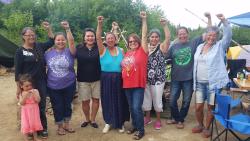(Fredericton-Ottawa-Vancouver) Indigenous communities and advocacy groups are disappointed and concerned about the outcomes of Canada’s 2017 Energy & Mines Ministers Conference, which ended last week in St. Andrews, New Brunswick.
“None of the 200 pages of documents and 11 priority action points coming out of this conference even include the words ‘Indigenous rights,’ ‘consent,’ ‘mining wastes,’ ‘tailings,’ risks of ‘spills,’ or ‘failures.’ Frankly, this is troubling and disconcerting given the are serious concerns many of our communities have,” states Jacinda Mack, coordinator of First Nations Women Advocating Responsible Mining (FNWARM). “We expect governments to take meaningful actions to address issues squarely.” Mack’s community was devastated by the Mount Polley disaster in British Columbia in 2014—the biggest mining spill in Canadian history.
Grand Chief Ron Tremblay of the Traditional Wolastoq Grand Council in New Brunswick says, “The outcome of the meeting is even more disturbing for our people given that the Trudeau government committed to work towards reconciliation and to implementing the UN Declaration on the Rights of Indigenous Peoples, including the right to free, prior and informed consent.”
40,000 Signatures Petition Delivered to Minister Carr
Jacinda Mack of FNWARM delivered a 40,000-strong SumOfUs petition to Jim Carr, Federal Minister of Natural Resources, urging the Trudeau government not to let Imperial Metals off the hook and enforce the federal Fisheries Act over Mount Polley mining disaster.
Sisson Mine: No Consent, Not Economically Viable
Grand Chief Tremblay of the Traditional Wolastoq Grand Council is concerned about closing remarks made last week to the media by Federal and Provincial Ministers Jim Carr and Rick Doucet about the massive Sisson Mine Project in Wolastoq territory, New Brunswick. He says, “Contrary to what the Ministers said, five out of six affected Wolastoq Indigenous communities did not consent to the project. The Accommodation Agreement referred to by the Ministers set, at best, the terms with the Province in case of the project goes ahead, but certainly does not support or give consent to the project.”
The Traditional Grand Council also points out that the Agreement was signed under threat from the Province to not renew other long-standing tax sharing agreements for HST, petroleum, tobacco, and lottery revenues essential to the communities.
The Canadian Environmental Assessment Agency concluded that the project would result in ‘significant adverse environmental effects’ on the rights of Wolastoq communities. This Sisson Project is not economically viable and its feasibility studies use unrealistic, overestimated prices for tungsten—twice as high as current world market levels.
Ministers Pressed to Listen to Those Affected by Mines
Indigenous communities and advocacy groups urge Federal, Provincial and Territorial Mines Ministers to open dialogue and listen to those affected by mines in Canada or by Canadian mining companies working abroad. Ugo Lapointe from MiningWatch Canada says, “You won’t change mining practices and you won’t get the best policies and laws if you don’t meaningfully listen to those that are the most negatively affected by this industry.”
“Canada must adhere to its international human rights obligations, such as those outlined in the UN Guiding Principles on Business and Human Rights and the UN Declaration on the Rights of Indigenous Peoples,” says Tara Scurr from Amnesty International Canada. “Canada has been taken to task at the United Nations many times for failing to fulfil its obligations in the context of resource extraction. Canada’s Mines Ministers cannot ignore this responsibility.”
The groups intend to pressure the Ministers to open new spaces for meaningful discussions, actions and measures to be taken ahead of the next Mines Ministers Meeting in Nunavut, in 2018.
The groups want to extend their gratitude for all those who took time to meet them this week, including: Wolastoq Grand Council; Wolastoqiqyik Grandmothers at their camp on the proposed Sisson site; Maliseet Nation Conservation Council; New Brunswick MLAs David Coon (Green Party) and Kirk MacDonald (Progressive Conservative); and the staff from the New Brunswick Departments of Environment, Energy and Resources Development, Health, and Aboriginal Affairs.
For more information:
- Growing liability of contaminated mining sites in Canada: Table 1
- Recent studies showing an increased rate of catastrophic failures and mining spills: Figure 1
- Known mining spills above 1 million litres in Canada since 2008: Table 2
- Experts Recommendations to prevent future catastrophic failures and mining spills
- Sisson Project issues: CCNB and MiningWatch Canada overview
- Blog about Jacinda Mack’s visit by Tracy Glynn
- Sign petition
- Support legal actions
- Support documentary film
- Support Wolastoqiqyik Grandmothers Camp
Contact information:
- Grand Chief Ron Tremblay, Traditional Wolastoq Grand Council, 506-455-1577
- Ramona Nicholas, Wolastoqiqyik Grandmothers, 506-426-1887
- Jacinda Mack, First Nation Women Advocating for Responsible Mining, 250-302-9134
- Ugo Lapointe, MiningWatch Canada, 514-708-0134
- Tara Scurr, Amnesty International Canada, 250-703-1141
- Tracy Glynn, Conservation Council of New Brunswick, 506-458-8747, 506 440-5592
- Joan Kuyek, Independent Mining Analyst, 613-795-5710
- Dr. David Chambers, Center for Science in Public Participation, 406-585-9854
- Jackie McVicar, United for Mining Justice, 902-324-2584
